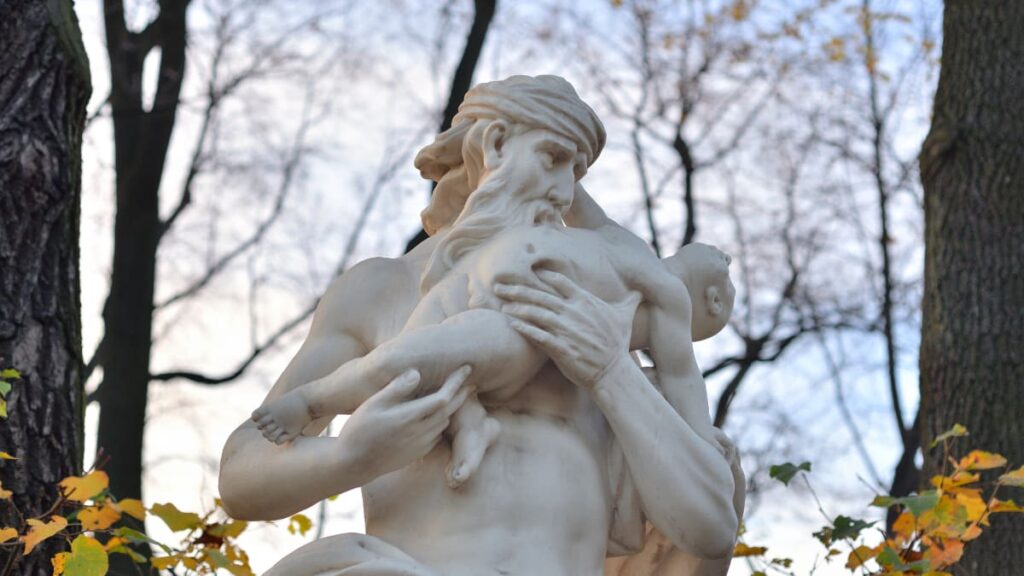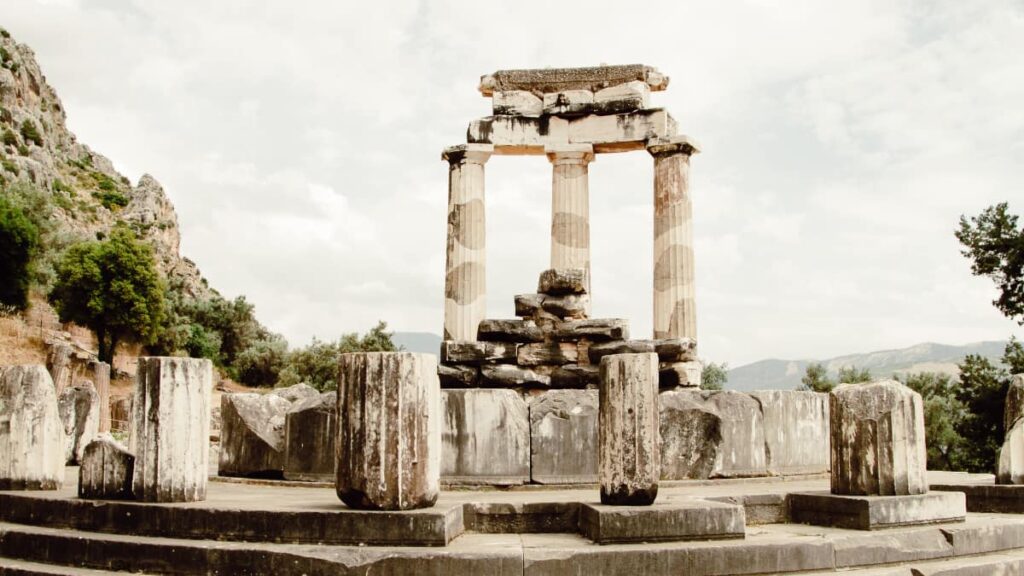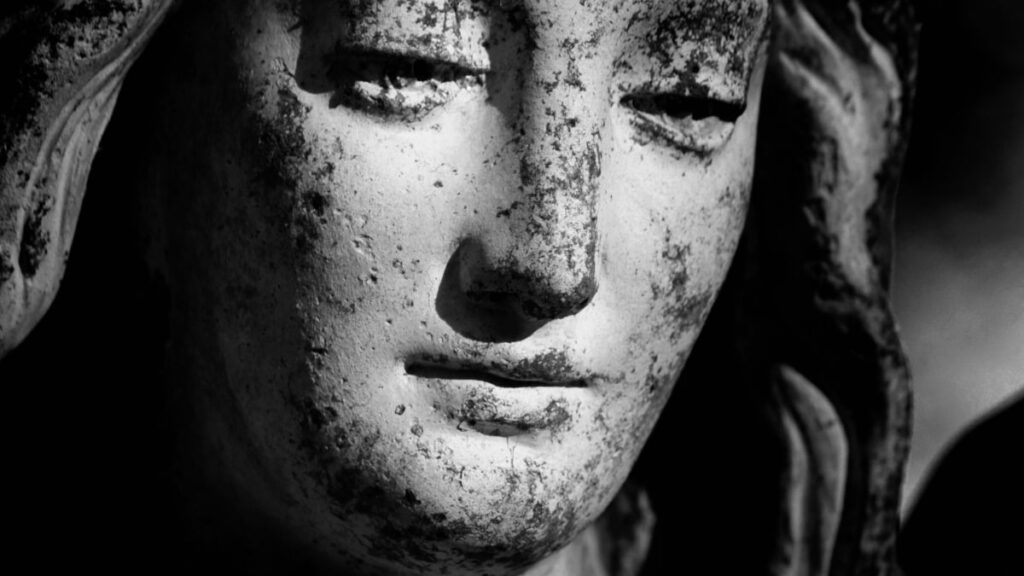When fate played games with gods—epic twists from ancient stories unfold

In every culture, myths of destiny reveal divine figures entangled in fate’s grip—often falling despite their power, plans, or pride.
From secret dreams to deadly oracles, destiny didn’t just guide heroes—it rewrote entire mythologies, shaking the heavens and dethroning gods.
These stories aren’t just ancient—they’re timeless. So step into a world where destiny doesn’t whisper, it roars. The unraveling begins now.
The Curse of Cronus: Time Devours All
Cronus feared a prophecy: one of his children would dethrone him. To stop fate, he swallowed them all—except one.
But destiny isn’t optional in mythology. His actions only sealed the path toward his fall and Zeus’s inevitable rise.
Myths of Destiny in the Titan’s Rise
Cronus’s story defines the myths of destiny. Guided by fear, he tried rewriting the future with violence—only to fulfill it faster.
His paranoia led to cosmic imbalance. The world fell into chaos, ruled by time itself. Zeus’s rebellion was a correction.
What began as an act of self-preservation became fate’s trap. The myth shows how trying to escape destiny only ensures its success.
Oracle Predictions in Myths of Cronus
The prophecy delivered to Cronus is part of a long tradition of oracle predictions in myths, where knowledge becomes a burden.
In Hesiod’s Theogony, Gaia and Uranus warned Cronus of his own downfall—predicting a child greater than he.
Greek myths often turn prophecy into a cycle: the harder it’s resisted, the quicker it comes. Cronus learned that too late.
How Myths of Destiny Shaped Zeus’s Birth
Rhea, Cronus’s wife, defied him. Saving Zeus was a direct challenge to fate—but also an act within the myths of destiny tradition.
She hid her son, gave Cronus a stone, and raised the future king in secret—fulfilling the very prophecy Cronus feared.
Destiny didn’t just crown Zeus; it was the architect of his rise. Without it, the Olympians might never have ruled at all.
Oedipus and the Inescapable Fate
From the moment Oedipus was born, his life was shadowed by fate. His parents tried to avoid it—and doomed him in the process.
This tale isn’t just tragedy—it’s a blueprint of how myths of destiny reflect fear, denial, and the cruel beauty of fulfillment.
Myths of Destiny and Tragic Kings
Among all myths of destiny, Oedipus’s story remains unmatched in irony. Every move he made brought him closer to the prophecy.
His parents abandoned him to escape fate. He fled his home to protect them. In truth, each step carved his tragic legacy.
Oedipus wasn’t cursed with bad luck—he was cursed with inevitability. That’s what makes this myth unforgettable, even today.
Mythical Predictions and Parental Fear
Many mythical predictions begin with a parent’s fear. In Thebes, Laius heard a prophecy that his son would kill him.
Rather than raise Oedipus with love or caution, he discarded him—planting the very seeds of destruction.
Across mythologies, parental attempts to cheat fate only strengthen it. This pattern repeats from Greek to Babylonian lore.
Why Myths of Destiny Still Haunt Modern Tragedy
The myths of destiny echo in modern stories—from Shakespeare to sci-fi. Why? Because the trap of fate feels all too human.
As Edith Hall explains in her book Greek Tragedy: Suffering under the Sun, Greek tragedy “constitutes the dramatic expression of an enquiry into suffering, an aesthetic question mark performed in enacted pain.”
Fate, in myth and life, isn’t always fair—but it always arrives, unbending, and reshaping everything in its path.
Ragnarok: The End Written in Advance
In Norse mythology, fate is not a twist—it’s a deadline. Myths of destiny here are prophecies that guarantee cosmic collapse.
The gods know what’s coming. They prepare, they resist, and still, Ragnarok arrives. That’s destiny in its most brutal form.
Myths of Destiny in Norse Collapse
Among the most powerful myths of destiny, Ragnarok stands as a prophecy that no god, no matter how mighty, can escape.
From Odin’s sacrifices to Thor’s doomed final battle, every choice leads straight toward destruction—and they know it.
This myth doesn’t tease fate; it embraces it. That’s what makes it unforgettable: the gods march willingly into their own end.
Oracle Predictions in Myths of Ragnarok
The oracle predictions in myths like Ragnarok are clear and chilling. The völva—seeress—tells Odin exactly how it will unfold.
In the Völuspá, part of the Poetic Edda, she speaks of wolves devouring the sun, of chaos, and gods falling in flame.
Unlike Greek oracles, Norse prophecy is straightforward: no riddles, no escape, just fate laid bare before the storm.
Prophecy Elements in Norse Mythology
| Prophetic Element | Source Text | Fulfillment in Myth |
|---|---|---|
| Odin’s Death | Völuspá, stanza 53 | Odin is killed by Fenrir during Ragnarok |
| Thor vs. Jörmungandr | Völuspá, stanza 56 | Thor kills the serpent but dies after |
| Heimdall vs. Loki | Völuspá, stanza 51 | Both slay each other in final battle |
| Sun Devoured by Wolf | Völuspá, stanza 40 | Sköll swallows the sun |
| Ship Naglfar Sets Sail | Völuspá, stanza 49 | Dead sail to war under Loki’s lead |
This table shows how Norse myths deliver prophecy not as metaphor, but as pre-written narrative events—epic and inescapable.
Loki’s Role in the Myths of Destiny
Loki is the wild card in the myths of destiny, but even his chaos can’t alter fate—he’s woven into its fabric.
His betrayals, his children, even his death are prewritten. He’s not the cause of Ragnarok—he’s one of its consequences.
This myth reminds us that in some worlds, even chaos has a script—and destiny devours all, trickster or not.
Egyptian Warnings and Divine Uprisings
In Egyptian lore, fate wasn’t always final—but it was deeply woven into divine conflict. Myths of destiny were written in stars and scrolls.
Unlike other traditions, these myths mix cycles and uprisings—where destiny breaks tradition and sets a new divine order in motion.
Myths of Destiny and the Eye of Ra
One of Egypt’s oldest myths of destiny begins with rebellion—humanity’s defiance and the Eye of Ra’s violent response.
To punish mortals, Ra sends Sekhmet to purge the earth. Blood flows until destiny shifts—and she’s tricked into stopping.
This tale shows a rare twist: divine rage unleashed by fate, but subdued by mercy. Even gods must adapt to destiny’s edge.
Mythical Predictions in the Book of the Dead
In the Book of the Dead, mythical predictions unfold not through characters, but rituals—prophecies of what souls must face after death.
Chapter 125 warns of the Weighing of the Heart, where judgment is not avoided, only prepared for.
Egyptian fate isn’t about shock—it’s structure. You don’t escape it. You align with it, or you’re erased from eternity.
Osiris, Horus, and the Myths of Destiny
Osiris’s death and Horus’s rise are central to myths of destiny in Egypt: cycles of betrayal, death, and rightful return.
Set murders Osiris, but Isis’s magic and Horus’s challenge restore balance. Prophecy didn’t prevent death—it demanded justice.
This myth mirrors Egypt’s worldview: destiny moves through conflict, but its goal is always restoration, not punishment.
Heracles, Hera, and the Loops of Fate
Heracles wasn’t just strong—he was trapped. The myths of destiny tied his glory to suffering, and his heroism to divine torment.
Driven mad by Hera, he faced impossible tasks. Fate didn’t spare him; it sculpted him into a legend through pain.
Myths of Destiny Behind the Twelve Labors
In the myths of destiny, Heracles’s strength wasn’t enough to change fate—only to survive it. His labors were punishment and prophecy.
After killing his family in a frenzy, he was condemned to twelve impossible trials. Each one pulled him closer to redemption.
The gods didn’t offer him escape. They offered him transformation. Destiny, here, was both cage and chisel.
Oracle Predictions in Myths of Heracles

Oracle predictions in myths also played a key role in Heracles’s life. It was the Oracle of Delphi that commanded him to serve Eurystheus.
Even his madness came from divine will. Hera’s jealousy wasn’t just personal—it fulfilled a larger mythic order.
Heracles became a hero not by resisting the gods, but by enduring their design, echoing a theme seen across mythologies.
Madness, Glory, and the Myths of Destiny
The final acts of Heracles reveal the paradox in the myths of destiny: the path to greatness is paved with divine cruelty.
• Hera cursed him from birth, setting fate in motion
• His madness and exile triggered the twelve labors
• Oracle guidance kept him chained to divine will
• His death was brutal—but led to immortality
• Destiny didn’t break him; it completed his myth
In Heracles, we see fate as both burden and blueprint—reminding us that even heroes bend to mythic design.
Cassandra’s Curse: Truth Without Power

Cassandra’s fate wasn’t just tragic—it was cruelly ironic. The myths of destiny gave her the truth but stole her voice.
Her visions were clear, her warnings sincere. But no one believed her, and Troy burned because fate made disbelief part of her curse.
Myths of Destiny and the Fall of Troy
In the myths of destiny, few figures suffer like Cassandra. Her curse wasn’t ignorance—it was being right with no one listening.
She foresaw Troy’s ruin, her own death, and Agamemnon’s murder. Every vision came true, and still she was mocked.
Her myth shows that destiny isn’t just what happens—it’s who gets heard, and who’s doomed to silence.
Mythical Predictions that Went Ignored
Throughout myth, ignored mythical predictions lead to collapse. Cassandra’s curse echoes in many cultures: the unheard prophet trope is universal.
In Greek tragedy, her role becomes symbolic—wisdom cast aside by pride, power, or fear. The cost is always irreversible.
Warnings in myth rarely change the future. Instead, they highlight humanity’s refusal to listen, even when the truth screams.
Prophetic Pain in Myths of Destiny
Cassandra’s myth perfectly captures the torment at the heart of many myths of destiny: the pain of knowing—and never being believed.
In Aeschylus’ Agamemnon, as she foresees her death and the fall of the house she enters, she cries that Apollo, god of all paths, has become only the god of death to her—”thou hast destroyed me, thou, my love of old.”
Her story shows that destiny isn’t just about fulfillment—it’s about helpless truth, denied until it’s too late to stop the fire.
Divine Reversals in Eastern Traditions
Eastern mythology treats destiny not as doom, but as design. Myths of destiny here often revolve around balance, karma, and rebirth.
Gods aren’t trapped—they move through cycles. Still, fate plays its part, especially when balance is broken by desire or deception.
Myths of Destiny in Hindu Epics
In the myths of destiny found in the Mahabharata and Ramayana, divine will and fate weave tightly together. No action is without consequence.
Krishna’s guidance, Rama’s exile, and Arjuna’s hesitation are all shaped by dharma—cosmic duty—and karma’s relentless wheel.
Destiny doesn’t strike blindly here. It unfolds through responsibility, reminding mortals and gods alike that no one escapes cosmic law.
Oracle Predictions in Myths from Asia
Across South and East Asia, oracle predictions in myths serve more as guidance than punishment. They warn rather than condemn.
In Japanese lore, Amaterasu’s withdrawal from the world signals imbalance—requiring ritual, humility, and community effort to restore order.
These myths show a different fate: not inevitable tragedy, but a call to act. Prophecy becomes a chance for correction.
Rebirth, Karma, and the Myths of Destiny
In Eastern myths of destiny, the soul’s journey stretches across lifetimes. Fate isn’t final—it’s layered, evolving, and deeply personal.
Rebirth allows correction, karma ensures accountability. Even divine beings must reckon with their choices across cosmic time.
These traditions shift the meaning of destiny—from destruction to progression. The cycle is harsh, but never without hope.
Lessons from the Threads of Fate
Across cultures, myths of destiny share one message: no one, not even gods, can outrun what’s written in the stars.
Yet these stories do more than warn—they teach us how ancient minds understood consequence, power, and the limits of control.
Myths of Destiny Across Cultures
From Greece to Japan, the myths of destiny echo each other: prophecy delivered, fate resisted, and destiny fulfilled—often with divine fallout.
These myths vary in form, but their core is the same: fate is unavoidable, but how it unfolds still depends on character.
Even doomed gods make choices. That tension—between power and predetermination—is what gives these stories timeless depth.
Shared Patterns in Mythical Predictions
Looking closer, mythical predictions across civilizations share striking similarities: dreams, oracles, curses, and cosmic signs.
In Babylon, Egyptian, and Greek myths alike, prophecy appears early—and often ignored until too late.
These patterns show a global fascination with future knowledge, and an equally universal resistance to it.
What Myths of Destiny Reveal About Us
The myths of destiny don’t just reflect ancient gods—they reflect us. We also fear what we can’t control, and chase what we shouldn’t.
Myth is memory and mirror. It reminds us that fate often walks beside pride, and tragedy follows when we refuse to listen.
These tales endure not just for their drama, but because their truths still feel hauntingly close.
The Final Thread: Destiny Always Wins
Across myths, destiny is more than fate—it’s the silent force guiding empires to rise and gods to fall.
Myths of destiny aren’t about punishment; they’re about truth, no matter how long the divine tries to delay it. Each story shows that no throne is eternal, no prophecy without consequence.
In myth, downfall isn’t chaos—it’s cosmic realignment. Destiny is the great equalizer, moving through time, dream, and war until the balance is reset.
Every civilization imagines an ending—whether through fire, flood, silence, or stars collapsing. Explore how myths reveal what we fear most… and what we secretly expect.



